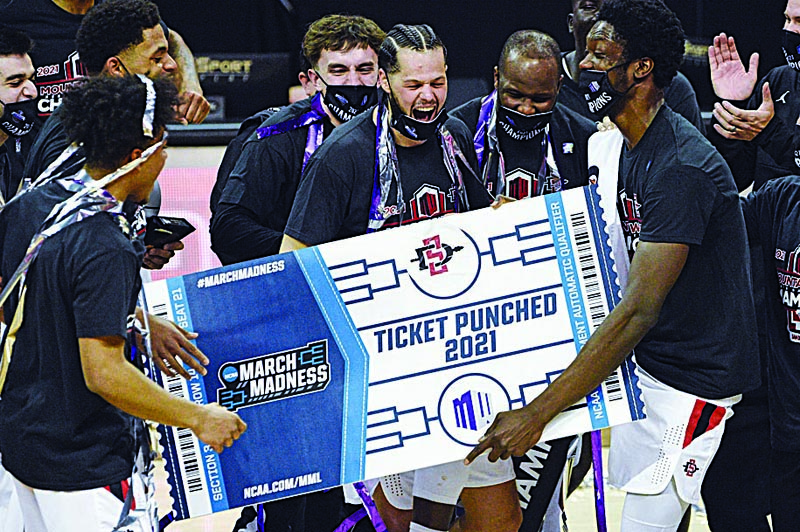 LAS VEGAS: The San Diego State Aztecs celebrate their 68-57 victory over the Utah State Aggies in the championship game of the Mountain West Conference basketball tournament at the Thomas & Mack Center on March 13, 2021 in Las Vegas, Nevada. - AFP
LAS VEGAS: The San Diego State Aztecs celebrate their 68-57 victory over the Utah State Aggies in the championship game of the Mountain West Conference basketball tournament at the Thomas & Mack Center on March 13, 2021 in Las Vegas, Nevada. - AFP
WASHINGTON: March Madness, the annual US college basketball tournament that was wiped out last year by COVID-19, returns with a challenge unlike any it has faced after the bracket was revealed Sunday. The 68-team event, usually spread across the nation, will be played entirely at Indianapolis, with safety protocols in place to protect teams as they complete games from Thursday to April 5 in the basketball-mad state of Indiana. The billion-dollar spectacle is a US television sports staple, where future NBA stars are showcased and predicting outcomes has become an American tradition.
"This is a great time of year where we get to see the adulation, victories and everything that goes on with college basketball," said Mitch Barnhart, National Collegiate Athletic Association (NCAA) men's basketball committee chair. "What we're seeing is this thing our country loves. We forget what these coaches and athletes missed last year. They didn't get a chance to celebrate."
Instead of spreading the event across the country, officials created a bubble atmosphere in the heart of a state where the boys' high school basketball tournament is known as "Hoosier Hysteria" and a small town team's rags-to-riches state title run became "Hoosiers" the Hollywood movie.
With past champions Virginia, Duke and Kansas among teams knocked out of conference tournaments last week by positive COVID-19 tests, the need for safety protocols is clear. One team per floor will be housed in area hotels with only one person per room. Masks, social distancing and social tracing devices will be used. "Once we get people here, we feel confident we will be able to progress on and get through the rounds of the tournament," Barnhart said.
Teams must test negative for seven days before arriving in Indianapolis and are subject to daily tests thereafter. Ten arrived on Saturday and 17 more were due on Sunday. Teams will be allowed to compete with as few as five players. Teams can be replaced in the bracket due to COVID-19 for 48 hours with a stand-by squad for 48 hours before the bracket becomes final. College venues in and near Indy will be used as well as the home of the NBA's Indiana Pacers and the domed stadium where the NFL's Indianapolis Colts play, where the final is set to be played on April 5.
'Such a long hiatus'
Top-ranked and undefeated Gonzaga, 26-0, was made the top overall seed. The Bulldogs have a chance to become the first unbeaten champion since Indiana University's 32-0 title run in 1975-76. Gonzaga will open against the winner of a play-in game between Norfolk State and Appalachian State. Baylor, Illinois and Michigan were awarded the other number one seeds.
Gonzaga coach Mark Few told ESPN the wipeout of last year's NCAA tourney when his team was a title contender was like having "1,000 feet on concrete poured on your shoulders -- just crushing." The Bulldogs, whose only finals appearance in 2017 ended with a loss to North Carolina, feature five players from outside the United States, including two starters -- French junior guard Joel Ayayi and Canadian junior guard Andrew Nembhard.
Ayayi averages 11.8 points, 7.0 rebounds, 3.0 assists and 1.2 steals a game for Gonzaga while Nembhard averages 9.2 points, 2.4 rebounds, 4.2 assists and 1.1 steals a contest. International reserves include Mali freshman 7-foot (2.13m) center Oumar Ballo, Lithuanian sophomore guard Martynas Arlauskas and Russian sophomore forward Pavel Zakharov. "It has been a hard season," said Gonzaga starter Jalen Suggs. "We've been through a lot of adversity. But that group of guys we have in the locker room make it all worth it. It's a special group."
After last season left a crown unclaimed due to COVID-19, there's more emotion about declaring a champion following a campaign where teams had to handle uncertainty and rescheduling due to the virus. "Confident, excited, anxious, all of the above, it has been a long time coming but we're so glad it's here," NCAA senior vice president Dan Gavitt said. "It's very exciting to think about tipping off March Madness again after such a long hiatus." - AFP
.jpg)



